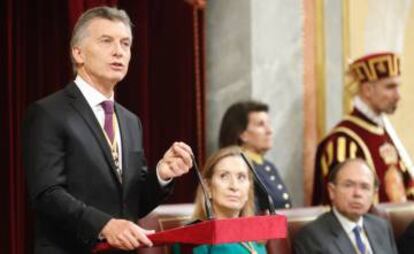Argentina’s President Macri begins state visit to Spain
Persuading Spanish companies to return to South American country will be priority during four-day stay
Argentinean President Mauricio Macri began a state visit to Spain on Wednesday. The stay began with full military honors as part of the Spanish Royal Household’s new protocol at the Royal Palace, the first time this has been applied for a state visit.

The Argentinean president then addressed Congress, telling deputies: “Fourteen months ago, Argentina began a historic change. We want to reduce poverty to zero, because a third of Argentineans still live in poverty and this is unacceptable. Ending drugs trafficking and uniting Argentineans, these are our three objectives.”
Accompanied by more than 200 business leaders, Macri will be focusing his four-day visit on persuading Spanish investors to return to his country.
Spanish companies such as Telefónica, Gas Natural, Santander and BBVA have a strong presence in Argentina
“We want Spain to occupy the role it once did, we want it to take part in a grand infrastructure plan,” said Argentinean Foreign Minister Susana Malcorra at a press conference earlier this week. The objective of the visit, as Spain’s Economy Minister Luis De Guindos has already noted, is for Argentina to be Spain’s “preferential investment destination.”
A decade ago, Spain was the number one investor in Argentina, with the country’s main businesses in Spanish hands. But over time, the United States has steadily taken over that position, particularly following the decision in 2012 by Macri’s predecessor, Cristina Fernández de Kirchner, to nationalize YPF, the jewel in the crown of Spanish hydrocarbons giant Repsol.
Spanish investment, like that of many other countries, has fallen off sharply since 2015, and nobody is expecting major commitments during Macri’s political and business meetings this week, because these things take time, and because Argentina is still seen as unstable.

But Spanish Prime Minister Mariano Rajoy, who knows Macri well, will throw his weight behind the Argentinean president and his decision to return his country toward liberal orthodoxy after the Kirchner years.
In return, Macri will be offering Spanish companies rates of return they are unlikely to find in many other countries. “We have these margins because we are imperfect: if we were Switzerland, we’d have Switzerland’s margins,” said Malcorra, who wants Spain to support Macri’s proposed trade deal between Mercosur and the European Union.
Macri will hold meetings with King Felipe VI, along with senior politicians, including former Spanish Prime Minister José María Aznar, who worked closely with Macri in the early stages of his career. He will also be meeting Spain’s business leaders, and has organized a working breakfast with representatives from the Ibex 35 index of leading Spanish companies, many of which already have a strong presence in Argentina, such as Telefónica, Gas Natural, and lenders Santander and BBVA.
The president’s popularity has fallen sharply since he took office a year ago, in large part due to his family’s business dealings. At the same time, the economy is stronger and inflation has been reined in. For the moment, his authority remains unchallenged, largely because of Argentina’s fractured opposition, and most analysts believe he is steadily consolidating his position. Notably, he has brought a number of labor leaders with him to Spain in a move that has been interpreted as showing business leaders that he has the support of this traditionally powerful sector.
English version by Nick Lyne.
Tu suscripción se está usando en otro dispositivo
¿Quieres añadir otro usuario a tu suscripción?
Si continúas leyendo en este dispositivo, no se podrá leer en el otro.
FlechaTu suscripción se está usando en otro dispositivo y solo puedes acceder a EL PAÍS desde un dispositivo a la vez.
Si quieres compartir tu cuenta, cambia tu suscripción a la modalidad Premium, así podrás añadir otro usuario. Cada uno accederá con su propia cuenta de email, lo que os permitirá personalizar vuestra experiencia en EL PAÍS.
¿Tienes una suscripción de empresa? Accede aquí para contratar más cuentas.
En el caso de no saber quién está usando tu cuenta, te recomendamos cambiar tu contraseña aquí.
Si decides continuar compartiendo tu cuenta, este mensaje se mostrará en tu dispositivo y en el de la otra persona que está usando tu cuenta de forma indefinida, afectando a tu experiencia de lectura. Puedes consultar aquí los términos y condiciones de la suscripción digital.









































